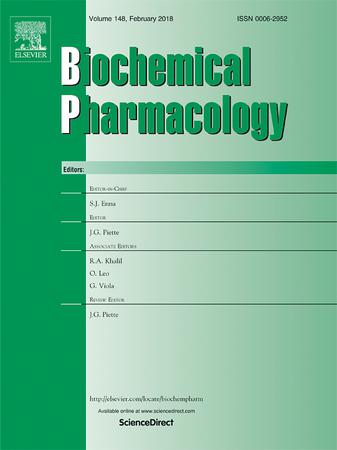Targeting the CXCR7 pathway with TC14012 to inhibit endothelial necroptosis and lung cancer metastasis
IF 5.3
2区 医学
Q1 PHARMACOLOGY & PHARMACY
引用次数: 0
Abstract
Endothelial necroptosis plays a crucial role in regulating cancer metastasis. Our previous research demonstrated that TC14012, which is an agonist of CXCR7, exhibits protective effects against endothelial injury. This study was designed to elucidate the effects of TC14012 on endothelial necroptosis and cancer lung metastasis, along with deciphering the underlying molecular mechanisms. The trans-well analysis system was used to evaluate the trans-endothelial migration ability of the tumor cells. Cell death was evaluated with Ethidium Homodimer 3 (EthD-3) staining and flow cytometry analysis. The expression and phosphorylation of MLKL or RIPK3 were evaluated using Western blot. The effects of TC14012 on cancer lung metastasis in vivo were determined using the mouse hematogenous metastasis model. The results showed that TC14012 treatment significantly suppressed trans-endothelial migration of lung cancer cells, through effectively counteracting endothelial cell death induced by the tumor cells in vitro. Upon inhibition of cell necroptosis with necrosulfonamide (NSA), an MLKL inhibitor, the suppressive effects of TC14012 on endothelial cell death were significantly alleviated. Further investigations unveiled that TC14012, via its interaction with CXCR7 receptor rather than CXCR4, impeded the phosphorylation and subsequent activation of the RIPK3/MLKL signaling cascade. Ultimately, in vivo experiments demonstrated that administration of TC14012 mitigated lung infiltration of pre-labeled tumor cells and reduced lung metastasis in mice subsequent to intravenous injection of tumor cells. In summary, TC14012 effectively retards lung cancer metastasis by inhibiting endothelial necroptosis and the consequential trans-endothelial migration of tumor cells, through modulating the CXCR7/RIPK3/MLKL signaling.

TC14012靶向CXCR7通路抑制内皮坏死下垂和肺癌转移
内皮性坏死性上睑下垂在肿瘤转移调控中起着至关重要的作用。我们之前的研究表明TC14012是CXCR7的激动剂,对内皮损伤具有保护作用。本研究旨在阐明TC14012对内皮细胞坏死下垂和肺癌肺转移的影响,并解读其潜在的分子机制。采用跨孔分析系统评价肿瘤细胞的跨内皮迁移能力。采用乙二聚体3 (Ethidium Homodimer 3, EthD-3)染色和流式细胞术分析细胞死亡情况。Western blot检测MLKL和RIPK3的表达及磷酸化水平。采用小鼠血液转移模型研究TC14012在体内对肺癌肺转移的影响。结果表明,TC14012通过有效对抗肿瘤细胞在体外诱导的内皮细胞死亡,显著抑制肺癌细胞的跨内皮迁移。用MLKL抑制剂necrosulfonamide (NSA)抑制细胞坏死下垂后,TC14012对内皮细胞死亡的抑制作用明显减轻。进一步的研究表明,TC14012通过与CXCR7受体而不是CXCR4的相互作用,阻碍了RIPK3/MLKL信号级联的磷酸化和随后的激活。最终,体内实验表明,TC14012可减轻静脉注射肿瘤细胞后小鼠预标记肿瘤细胞的肺浸润,减少肺转移。综上所述,TC14012通过调节CXCR7/RIPK3/MLKL信号通路,抑制内皮坏死及肿瘤细胞的跨内皮迁移,从而有效延缓肺癌转移。
本文章由计算机程序翻译,如有差异,请以英文原文为准。
求助全文
约1分钟内获得全文
求助全文
来源期刊

Biochemical pharmacology
医学-药学
CiteScore
10.30
自引率
1.70%
发文量
420
审稿时长
17 days
期刊介绍:
Biochemical Pharmacology publishes original research findings, Commentaries and review articles related to the elucidation of cellular and tissue function(s) at the biochemical and molecular levels, the modification of cellular phenotype(s) by genetic, transcriptional/translational or drug/compound-induced modifications, as well as the pharmacodynamics and pharmacokinetics of xenobiotics and drugs, the latter including both small molecules and biologics.
The journal''s target audience includes scientists engaged in the identification and study of the mechanisms of action of xenobiotics, biologics and drugs and in the drug discovery and development process.
All areas of cellular biology and cellular, tissue/organ and whole animal pharmacology fall within the scope of the journal. Drug classes covered include anti-infectives, anti-inflammatory agents, chemotherapeutics, cardiovascular, endocrinological, immunological, metabolic, neurological and psychiatric drugs, as well as research on drug metabolism and kinetics. While medicinal chemistry is a topic of complimentary interest, manuscripts in this area must contain sufficient biological data to characterize pharmacologically the compounds reported. Submissions describing work focused predominately on chemical synthesis and molecular modeling will not be considered for review.
While particular emphasis is placed on reporting the results of molecular and biochemical studies, research involving the use of tissue and animal models of human pathophysiology and toxicology is of interest to the extent that it helps define drug mechanisms of action, safety and efficacy.
 求助内容:
求助内容: 应助结果提醒方式:
应助结果提醒方式:


